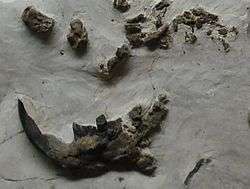Steneofiber
| Steneofiber Temporal range: Early Oligocene–Middle Miocene | |
|---|---|
 | |
| Fossil jaw | |
| Scientific classification | |
| Kingdom: | Animalia |
| Phylum: | Chordata |
| Class: | Mammalia |
| Order: | Rodentia |
| Family: | Castoridae |
| Subfamily: | Castorinae |
| Genus: | †Steneofiber Geoffroy, 1833 |
| Species | |
| |
Steneofiber is an extinct genus of beavers from Eurasia.
This small, 30-cm-long (1-ft-long) creature probably lived in large freshwater lakes, like present day beavers. A semiaquatic lifestyle is indicated by the presence of combing-claws, which living beavers use to waterproof their fur.[1] Most likely, it was incapable of bringing down trees like its modern relatives. Steneofiber was more terrestrial than modern beavers, living in burrows. The finding of a possible family group of Steneofiber skeletons in France has been used to infer that the genus employed a K-selected reproductive strategy like modern beavers, in which extensive parental care is given to a small number of offspring.[1] Steneofiber is among earliest known members of the subfamily Castorinae, which includes beavers more closely related to the two living species than to the recently extinct giant beaver.[2] It is probably descended from the earliest castorine, Propalaeocastor.[3]
References
- 1 2 Hugueney, M. & F. Escuillié (1995). "K-strategy and adaptative specialization in Steneofiber from Montaigu-le-Blin (dept. Allier, France; Lower Miocene, MN 2a, ±23 Ma): first evidence of fossil life-history strategies in castorid rodents". Palaeogeography, Palaeoclimatology, Palaeoecology. 113 (2–4): 217–225. doi:10.1016/0031-0182(95)00050-V.
- ↑ Korth, W.W. (2002). "Comments on the systematics and classification of the beavers (Rodentia, Castoridae)". Journal of Mammalian Evolution. 8 (4): 279–296. doi:10.1023/A:1014468732231.
- ↑ Wu, W., Meng, J., Ye, J. and Ni, X. (2002). "Propalaeocastor (Rodentia, Mammalia) from the early Oligocene of Burqin Basin, Xinjiang". American Museum Novitates. 3461: 1–16. doi:10.1206/0003-0082(2004)461<0001:PRMFTE>2.0.CO;2. hdl:2246/2771.